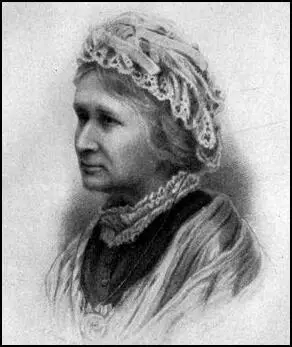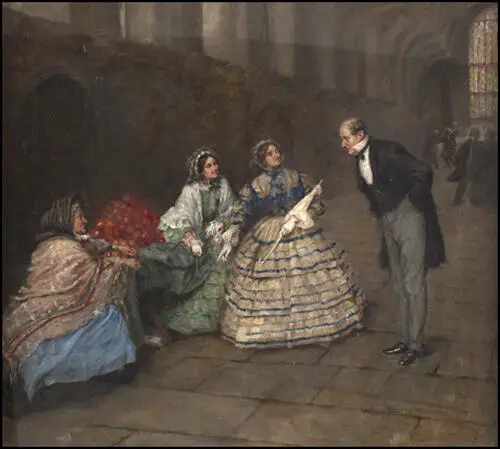Enfranchisement of Women Committee
John Stuart Mill was invited by the Liberal Party to stand for the House of Commons in the 1865 General Election for Westminster. The Kensington Society saw this as an opportunity to promote the campaign for women's suffrage. In May 1866, Barbara Bodichon wrote to Mill's step-daughter, Helen Taylor: "I am very anxious to have some conversation with you about the possibility of doing something immediately towards getting women voters. I should not like to start a petition or make any movement without knowing what you and Mr J. S. Mill thought expedient at this time... Could you write a petition - which you could bring with you. I myself should propose to try simply for what we were most likely to get immediately." (1)
The Kensington Society collected the 1,499 signatures in May and June 1866 and delivered it to Parliament. (2) The Enfranchisement of Women Committee was established in October 1866. However, its original name was the "Enfranchisement of Unmarried Women and Widows, Possessing the Due Property Qualification". (3)
The society attracted 88 members including Emily Davies, Lydia Becker, Jessie Boucherett, Barbara Bodichon, Helen Blackburn, Clementia Taylor, Alice Westlake, Peter Alfred Taylor and John Westlake. Louisa Garrett Smith was honorary secretary. It had "for its object the abolition of the legal disability which at present disqualifies women as such from voting for Members of Parliament." It hoped to achieve this aim by presenting further petitions to parliament in order to demonstrate the earnestness of women in this matter." (4)
Helen Taylor had objected to having men on the Enfranchisement of Women Committee. She was supported by her step-father, John Stuart Mill, who argued it would be educationally useful to have an exclusively female's woman's movement. Barbara Bodichon disagreed, citing her experience of meeting leaders of the women's movement in America. She came home of the opinion that the women there had wasted their energy by trying to do too much at once, by not working with men and by being too sentimental. (5)

Clementia Taylor, whose husband, Peter Alfred Taylor, had been very supportive of women's rights, wrote to Helen Taylor, about this issue: "I read.... your objection to a mixed committee of men and women. Now my experience bears testimony to the practical benefit resulting from the combined efforts of men and women - we gain advantage from the more logical and from the more practical qualities of men - and men gain from women more earnestness of purpose - more subtle views of questions - I believe so strongly in the reciprocal benefit of both I would from the earliest age have boys and girls educated together - associated together in all the higher purposes of life and believe that morally as well as mentally the word would gain much - but to our committee I deeply grieve that we are not at one upon this question, it was not without due thought and consideration that we determined upon the mixed working committee... I have been on committees formed of women only and upon more - men and women together - the latter certainly acted more effectively and I believe that the committees of men only would be less effective than if women were associated with them." (6)
Louisa Garrett Smith died, aged 31, from appendicitis on 6th February 1867. (7) She was replaced as honorary secretary by Emily Davies, because Barbara Bodichon was abroad. (8) Enfranchisement of Women Committee worked closely with the Kensington Society, who in less than a month it collected nearly 1,500 signatures (one important member, Dorothea Beale, refused to sign the petition. Helen replied when it was delivered: "My father will present the petition tomorrow (if that is still the wish of the ladies) and it should be sent to the House of Commons to arrive there before two p.m. tomorrow, Thursday June 7th directed to Mr Mill, and petition written on it. It is indeed a wonderful success. It does honour to the energy of those who have worked for it and promises well for the prospects of any future plan for furthering the same objects." (9)
On 7th June, 1867 Barbara Bodichon was ill and so Elizabeth Garrett and Emily Davies, escorted the great scroll to Westminster Hall and gave their petition to Henry Fawcett and John Stuart Mill, two MPs who supported universal suffrage. Mill, said, "Ah! this I can brandish with effect." (10) Louisa Garrett Anderson later recalled: "John Stuart Mill agreed to present a petition from women householders… Elizabeth Garrett liked to be ahead of time, so the delegation arrived early in the Great Hall, Westminster, she with the roll of parchment in her arms. It made a large parcel and she felt conspicuous. To avoid attracting attention she turned to the only woman who seemed, among the hurrying men, to be a permanent resident in that great shrine of memories, the apple-woman, who agreed to hide the precious scroll under her stand; but, learning what it was, insisted first on adding her signature, so the parcel had to be unrolled again." (11)

hiding first women’s suffrage petition under an apple-woman’s stall in Westminster Hall
until John Stuart Mill came to collect it.
During the debate on the issue, Edward Kent Karslake, the Conservative MP for Colchester, said in the debate that the main reason he opposed the measure was that he had not met one woman in Essex who agreed with women's suffrage. Lydia Becker, Helen Taylor and Frances Power Cobbe, decided to take up this challenge and devised the idea of collecting signatures in Colchester for a petition that Karslake could then present to parliament. They found 129 women resident in the town willing to sign the petition and on 25th July, 1867, Karslake presented the list to parliament. Despite this petition the Mill amendment to the 1867 Reform Act was defeated by 196 votes to 73. William Gladstone, was one of those who voted against the amendment. (12)
Enfranchisement of Women Committee came to an end in June, 1867. (13) The members joined either the London Society for Women's Suffrage (Barbara Bodichon, Jessie Boucherett, Emily Davies, Francis Mary Buss, Dorothea Beale, Anne Clough, Clementia Taylor, Alice Westlake and Elizabeth Garrett) and Manchester Society for Suffrage (Lydia Becker, Elizabeth Wolstenholme-Elmy, Ursula Bright, Jacob Bright and Josephine Butler) with the sole purpose of campaigning for women's suffrage. (14)
Primary Sources
(1) Clementia Taylor, letter to Helen Taylor (29th October, 1866)
I read.... your objection to a mixed committee of men and women. Now my experience bears testimony to the practical benefit resulting from the combined efforts of men and women - we gain advantage from the more logical and from the more practical qualities of men - and men gain from women more earnestness of purpose - more subtle views of questions - I believe so strongly in the reciprocal benefit of both I would from the earliest age have boys and girls educated together - associated together in all the higher purposes of life and believe that morally as well as mentally the word would gain much - but to our committee I deeply grieve that we are not at one upon this question, it was not without due thought and consideration that we determined upon the mixed working committee... I have been on committees formed of women only and upon more - men and women together - the latter certainly acted more effectively and I believe that the committees of men only would be less effective than if women were associated with them.
(2) Louisa Garrett Anderson, Elizabeth Garrett Anderson (1939)
John Stuart Mill agreed to present a petition from women householders… On 7th June 1866 the petition with 1,500 signatures was taken to the House of Commons. It was in the name of Barbara Bodichon and others, but some of the active promoters could not come and the honour of presenting it fell to Emily Davies and Elizabeth Garrett…. Elizabeth Garrett liked to be ahead of time, so the delegation arrived early in the Great Hall, Westminster, she with the roll of parchment in her arms. It made a large parcel and she felt conspicuous. To avoid attracting attention she turned to the only woman who seemed, among the hurrying men, to be a permanent resident in that great shrine of memories, the apple-woman, who agreed to hide the precious scroll under her stand; but, learning what it was, insisted first on adding her signature, so the parcel had to be unrolled again.
(3) Emily Davies, letter to Helen Taylor (24th June, 1867)
You may probably have heard that the Committee formed last autumn for the enfranchisement of women, has been dissolved. At the last meeting of the Committee it was agreed to place the "property", consisting chiefly of pamphlets and stationery, at Mrs Bodichon's disposal. I intend transferring to her also, as soon as she is able to receive them, the letters and other papers which are at present in my hands, and as I shall no longer be in any official sense a depository of documents on this subject, I ask you to discontinue the magazines which I have hithto received from you according to the agreement of last year.

